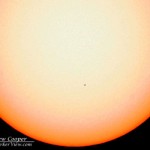This is your last chance this lifetime to witness a Venus transit! On June 5th the Earth, Venus and the Sun will line up correctly so that earthbound observers will see Venus cross the disk of the Sun.

To witness this event you only need to be on the daylight side of our planet when it occurs. The 2012 event favors the Pacific, Australia, Japan and eastern Asia.
For Hawai’i the event will begin at about 12:10pm with the Sun high in the sky, mid-point will be about 3:26pm and will end about 6:44pm, just before sunset. These times are only approximate, exact times will depend on the observer’s location and can vary by several minutes across the islands.
As always the single best source on the web (or anywhere) for eclipse and transit information is Fred Espenak’s eclipse website at NASA. Stop by whenever you have a question on upcoming events as well as viewing and photography tips.
Keck Observatory will be making an extra effort for this transit as Mauna Kea is perfectly positioned to observe the event. We will be webcasting the transit from a small telescope located at the summit. The webcast can be seen on your computer, or come over to our headquaters in Waimea to see the webcast and a live view in a solar telescope if the weather cooperates. there will be extra staff on hand to answer your questions.
Stay tuned to DarkerView for further details as the transit draws near.
1) Transit of Venus, Wikipedia Article, retrieved 8 Feb 2009
2) 2004 and 2012 Transits of Venus, Fred Espenak, NASA/GSFC, NASA Eclipse Website, retrieved 8 Feb 2009

